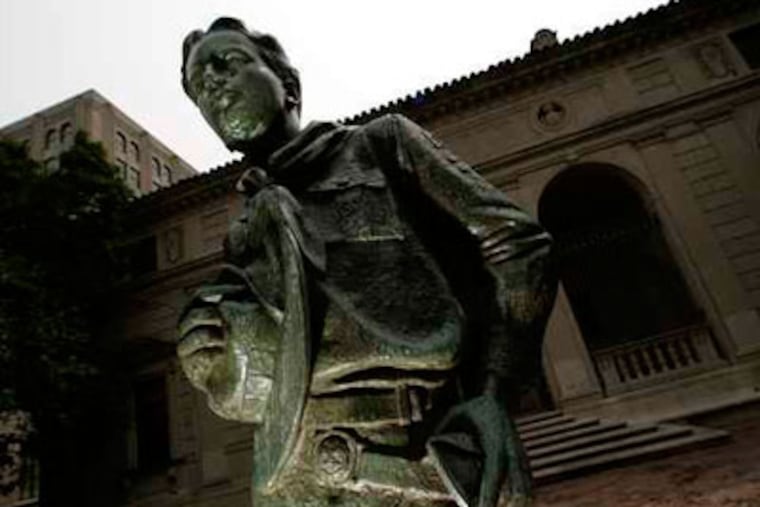Reports of city's pact with Boy Scouts 'premature'
A proposed settlement to end a lengthy battle between the city and the Boy Scouts deteriorated Thursday amid confusion and politicking that left the ownership of the group's Center City headquarters uncertain.

A proposed settlement to end a lengthy battle between the city and the Boy Scouts deteriorated Thursday amid confusion and politicking that left the ownership of the group's Center City headquarters uncertain.
On Wednesday night, the administration of Mayor Nutter said it expected City Council to introduce legislation Thursday required for Philadelphia to sell the property to the Boy Scouts.
That came as a surprise to Councilman Darrell L. Clarke, who would have introduced the bill because the Boy Scouts building is in his district, and the City Charter requires Council approval for the sale of city-owned property.
"I have no idea where they [the Nutter administration] got that from," Clarke said Thursday. "My conversations with the administration centered on a process that was not close to being completed on my end."
It wasn't clear how the miscommunication occurred.
Clarke said he had spoken to Nutter's chief of staff, Clay Armbrister, about his plans Wednesday. Armbrister said he had apologized to Clarke for the misunderstanding.
"Unfortunately, there was a misinterpretation of certain information and the administration prematurely announced what we thought were Councilman Clarke's intentions," Armbrister said. "I have spoken to him personally, expressing my regrets for our premature expression of his intentions."
Both Clarke and Mark McDonald, a spokesman for Mayor Nutter, said they believed they could resolve outstanding issues soon.
Clarke said he wasn't ready to offer the bill because he wanted more time to discuss the proposal with key constituents. They include the building's neighbors and the gay and lesbian community, whose objections to the Boy Scouts' national policy of not allowing openly gay scouts and scoutmasters led to the court case that put the headquarters in play.
"I would think any resolution of this issue would definitely include those individuals," he said.
Under a proposed settlement that the city and the Boy Scouts announced Wednesday, the city-owned building, which the scouts have occupied for 80 years, would be sold for $500,000. Both sides agree its appraised value is at least $1 million. In return, the scouts would not seek repayment of $1 million in legal fees from Philadelphia, which they are entitled to as the winner of a federal civil rights case.
Sandy Girifalco, one of the scouts' attorneys, did not return a call seeking comment.
The negotiated agreement follows a U.S. District Court jury verdict in June that Philadelphia had violated the Boy Scouts' First Amendment rights by moving to evict them after the local group refused to explicitly renounce the national policy of not allowing openly gay scouts and scoutmasters.
Andrew A. Chirls, a lawyer representing a group of people, most of them gay and lesbian, who had worked with the city on the issue over the years, said he wanted the city to continue with its appeal of the case, rather than settle.
He said the city and the Boy Scouts did not consult with his group on their agreement.
He questions the city's $1.1 million valuation of the property, pointing out that some homes near the Boy Scouts' 22nd and Winter Street headquarters sell for more than $2 million.
"It's a renaissance style mansion with an atrium and marble appointments and you're selling it for the price of a rowhouse," he said. "This is a subsidy. They're giving them a gift so they can discriminate in it."
The proposed settlement, however, gives the scouts two years to buy the building. In the meantime, the Cradle of Liberty Council would limit its operations to those the city views as nondiscriminatory.
Also Thursday, the Greater Philadelphia chapter of the American Civil Liberties Union of Pennsylvania, sent the Nutter administration a letter criticizing the proposed settlement.
"This settlement is a bad deal not only for lesbian, gay, bisexual, and transgendered Philadelphians, but also for the taxpayers of the City of Philadelphia at a time when the city is struggling to balance its budget without drastic cuts in city services," the letter said.
The Depression-era Beaux-Arts building, at 22d and Winter Streets, was built by the scouts but is on city land and effectively owned by Philadelphia. Despite the scouts' court victory, which the city appealed, the city could have evicted the scouts if the eviction occurred without violating the organization's constitutional rights.
After the verdict, U.S. District Judge Ronald L. Buckwalter advised both sides to negotiate an end to the dispute.
Clarke said one of his concerns was that the property's current zoning would allow a high rise to be built on the site if the Boy Scouts sold the property, which neighbors would oppose.
He said he believes he can prevent that problem in any legislation he introduces to approve the sale from the city to the Boy Scouts.
Rob Stuart, past president of the Logan Square Neighborhood Association, said his group had not been included in settlement discussions but expected to be part of ongoing negotiations.
"I think people would be concerned if the scouts would sell it and it would be turned into something that is inconsistent with how the scouts have been doing up to now," Stuart said.
Staff Writer Jeff Shields contributed to this article.